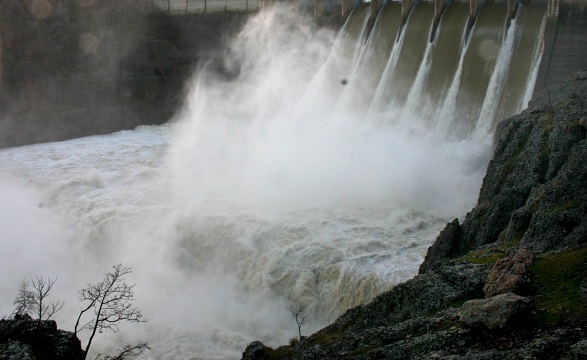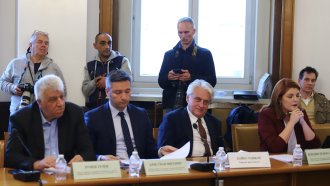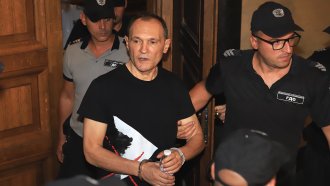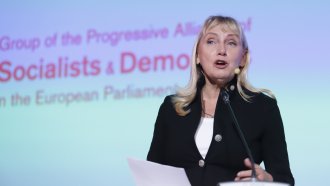Commentary
Recent amendments to the State Property Act restore nationalization: attorney at law
By Krassen Nikolov

PM Boyko Borissov inspects progress of "Hemus" highway
The most recent amendments to the State Property Act have brought us back to nationalization times [during communist rule], Veselin Georgiev, attorney at law, commented in an interview for Mediapool. Georgiev has represented countless clients in expropriation cases. He joins other voices from the guild in their criticism of the amendments, pointing to their unconstitutional nature and direct violation of citizens’ rights. The whole series of amendments, spanning over the last decade, since Boyko Borissov’s first term in office, consistently take away private property rights and have shrunk the inviolability of private property, provided in the constitution, to questionable at best.
Georgiev explained that the first State Property Act was enacted in 1996. The legislation developed a steady and consistent court practice until Boyko Borissov’s first government. Then, in 2009 the first amendments to the law were introduced, specifically regarding expropriation. Parliament just passed the most recent amendments to the law, which further tackle the same issues – barriers to expropriation.
“These amendments’ aim is to provide full ease to the state administration in cases of expropriation, which is often carried out at the owners’ expense.”
Georgiev also pointed out that with the amendments adopted during Borissov’s first government the state was let off of the requirement to actually prove to the court that there is a definite need for an expropriation. All the state or municipality have needed since was a for an approved detailed development plan with the territories in question to exsit.
Before these amendments were enacted most cases of expropriation got overturned by the supreme court. With the later and most recent provisions this has become virtually impossible. The additional rules require the court to accept expropriation as long as (1) the appropriate deed for expropriation is issued and (2) the property is associated with a detailed development plan. According to Georgiev, defining the existence of the development plan as grounds for expropriation serves to bypass actual court rulings, which have stood in the way of the state or municipalities to this point. Especially given that before this requirement, many expropriation orders did not survive the supreme court.
In fact, the deed and the development plan were what the state or municipality based their case in convincing the court there is a real public need for some kind of development - usually an infrastructure project. They then had to convince the court further that the only way to meet this need is expropriation. And at last - that this need cannot be met in any other way. In other words, before the amendments the law treated expropriation as a last resort and clearly prioritized (and generally protected) the rights of the private owners. This shifted dramatically by taking away courts privilege to actually decide on whether or not the government’s (or municipal) decision itself is justified in the first place. Instead, it now must accept the two documents, which essentially order the expropriation, as reason for approving expropriation.
But the amendments from 2009, which practically give way for the government to expropriate properties at will, are only a step in that direction. Up until 2010 the compensation for expropriation was calculated based on actual market prices. One of the main instruments in establishing what the market value of a property was, were bank loan deals. After 2010, this instrument, along with other, which are useful for determining the current market prices were cut off, leaving only mortgage deals for homes. This ultimately makes it impossible for experts to estimate the real market price of a property, which in turn leaves the owners with a compensation well below the actual value of their property. More often than not, an expert has nothing at all to base their assessment off, and no estimation is made at all. This might seem like a conundrum, but the implementation regulations of the law has got it covered: the document provided normative prices to be used in such cases. Those, naturally, are a mere fraction of anything close to the market value.
“This was the exact way in which the nationalization during communism was conducted”, Georgiev asserts.
26 is the number of amendments this law has had over the last decade, since Borissov’s first government. And each time they have served one single goal:
“To relieve the administration of the need to uphold the constitution”, Georgiev concludes.
In other news:
NOVA TV terminates contracts with investigative reporters Genka Shekerova and Miroliuba Benatova

Miroliuba Benatova (left) and Genka Shekerova (right)
As expected, NOVA TV terminated its contracts with investigative reporters Genka Shekerova and Miroliuba Benatova earlier this week. Hristo Hristov of one of Nova Broadcasting Group’s outlets, NETINFO, who recently went public with claims of “unprecedented pressure over the editorial policy” at NETINFO “since the new ownership took over”, has also been fired.
As of a few months ago Nova Broadcasting Group, which owns a number of media outlets, including the third largest TV network in Bulgaria, NOVA TV, is owned by the infamous brothers Kiril and Georgi Domuschiev. Ever since taking over the NBG, the news outlets, and especially the TV network, have seen a substantial outflow of journalists and news producers. Vacancies get filled quickly predominately by producers and associates from media outlets, whose editorial policies are identical to Delyan Peevski-owned media, most notably, the Channel 3 TV network.
The ‘cleansing’ of NOVA TV began with firing its long-time executive and co-founder Silvia Zurleva. Victoria Behar, the former head of Strategic Development, at NOVA TV’s news division quickly followed, after asking her newly appointed boss about her ties with Delyan Peevski during a staff meeting.
Special prosecutors raid Ivo Prokopiev's offices

The building where Prokopiev`s offices are
Special prosecutors raided the offices of one of Ivo Prokopiev’s companies, Alpha Finance Holding. Prokopiev is one of the owners and publishers of Dnevnik Daily and Capital Weekly, and a regular person of interest to the specialized institutions like the Specialized Prosecution and the Anticorruption Commission.
According to the head of the Specialized Prosecutor’s Office, Dimitar Petrov, the raid is not in any way connected to Prokopiev’s media businesses. The investigators, he explained, are looking for documents related to the selling of the Kaolin mines. Petrov announced that new charges were brought up to Prokopiev but refused to comment on what they are.
“As of late last week, Mr. Prokopiev and several others have been charged in cases, which are overseen by the Specialized Prosecutor’s Office. Today we received the search warrants for these offices. [We are looking for documents] we feel are relevant to the investigation. [They] have to do with the purchase and sale, and the transactions in general, connected to Kaolin’s assets”, Petrov explained.
According to Capital Weekly the charges in fact are not new but date from last July and are part of an investigation back in 2012. According to Capital Weekly, the documents in questions have been handed over willfully upon request. The documents themselves are from 2001.
Ivo Prokopiev is suing the state in the European Court for Human Rights for the continuous and unwarranted by his claims raids, investigations, and charges against him and his companies.
“I find the demonstrative way in which these documents are collected, something which can easily be accomplished with a letter, and most of which have already been handed over, a circus, part of a propaganda scheme. I personally, and my companies, will continue to uphold the law and cooperate with the authorities”, Prokopiev said, but warned that such raids “only confirm the public’s view that [the Prosecutor’s Office] acts as a weapon against those inconvenient to the government and the free press.”
Last year Prokopiev was charged with money laundering in connection to selling Kaolin. The case opened following a claim from the Anticorruption Commission, which stated that there were violations in selling the company and that the funds, which the deal generated were illegal.
Prokopiev is also accused in a case for being part of the deal for selling one of Bulgaria’s three electric distribution companies, EVN, along with the former minister of finance, Simeon Dyankov and the former minister of economy and energy, Traycho Traykov. The prosecutors claim that this deal has cost the country nearly 21 million leva in damages. Initially the claim was for 87 million leva but the prosecutors eventually cut that down to 21 million.
Bulgarian National Television practically bankrupt: BNT acting director Emil Koshlukov

The Bulgarian National Television is practically bankrupt but “that is not because of me”, the acting executive director of the network, Emil Koshlukov told the Council for Electronic Media during a hearing about BNT’s annual report, and called on the government to save the network.
The position of executive director of BNT was recently vacated by Konstantin Kamenarov, after being convicted of a DUI. Koshlukov took over until a new director is appointed and is one of the candidates for the permeate spot.
According to Koshlukov network’s debts currently amount to 37 million leva, 30 million of which are for contracts for sport shows and rights. His prediction is that the debts will rise to 44 million leva by the end of the year.
Koshlukov made an extensive presentation to CEM about all the recently signed contracts which drain the media and declared he has initiated their termination where possible. This is clearly part of Koshlukov’s campaign for future executive, and he was careful and clear as to having no prior knowledge about these contracts while serving as BNT 1’s program director.
Zina Trifonova, who heads BNT’s legal office resigned on the spot, calling the whole hearing “a lynching”. She accused the government of drastically underfunding BNT in general, and having no clear concept as to the public network’s future and role.
As for the sport contracts, she pointed out that in a number of cases BNT is required by law to air certain sport events like the Olympics, football world cups and the like.
BNT’s budget for 2019 is almost 68 million leva. The network has already made official requests for emergency additional funding to cover the growing deficit.
Political parties to return overpaid subsidies

The political parties will return the overpaid subsidies by the end of 2020, Parliament decided. The resolution was tabled by the majority after Slavi Trifonov - a talk show host, whose show just got canceled and who is regularly suspected to foster political ambitions – declared a month ago that instead of receiving 11 leva for every vote cast for their party (as per the law), the political parties actually get 13 in subsidies. The resolution’s scope affects not only the current parties in Parliament and those with more than 1% of the vote (as per the law) but also those from the former session of Parliament.
The total amount all the parties affected will have to return is estimated at 14,6 million leva.
“Those who are eligible for a subsidy and fail to return the overpaid amounts will receive only 70% of the second installment for 2019. This will be calculated based on the provisions from the resolution. The next installments will be reduced by 50% [in case the party continues to hold the overpaid amount]”, said Deputy Finance Minister Rositsa Velkova.
The revelation about the overpaid subsidies once more spiked the debate about the amount of funding political parties get from the state budget in general. Now the government is on its way of reducing the subsidies to 1 lev for every vote. The move is incredibly risky, as it makes the parties all the more vulnerable to receiving financing from elsewhere or collapsing due to inability to sustain themselves financially. The three largest parties, GERB, the Bulgarian Socialist Party and the Movement for Rights and Freedoms (DPS) are not too threatened for the time being, as all of them have savings deposits to fill the holes: GERB has managed to save 23 million leva, BSP and DPS – 6 million each from the state subsidies.
The procedure for choosing a new prosecutor general set for October 24

PM Boyko Borisov and the current prosecutor general Sotir Tzatzarov
The elections for a new prosecutor general will take place in October 24, instead of November 14, as the Supreme Judicial Council had initially decided. The reason for the three-week pull is that the candidates will be reviewed at the same time.
The nominations’ procedure will begin on July 15 and close on July 29. Then the candidates will have two weeks to present their vision for heading the Prosecutor’s Office over the next seven years, if elected. NGOs and scholars will have the chance to share their assessments and views on the candidates till October 16 before the final decision is made.
500 of Bulgaria’s dams are dangerous, 414 are in critical condition

Bulgaria has a total of 6840 dams. 414 of those are in critical condition, another 500 are thought to be dangerous, and 10 are under special supervision, Kiril Voynov, deputy head of the State Agency for Meteorological and Technical Control told BNT.
16 of the most dangerous dams are currently undergoing analysis, assessment and various risk mitigation measures are being taken to secure and renovate them safely. The government has allocated 500 million leva for dam renovations. Voynov expressed satisfaction with the way the government is dealing with these issues, regardless of the high-risk assessment he himself gives to about a thousand dams:
“The people may rest assured, by God’s grace. Because the government is wide awake.”, he said.
He went on to elaborate on the important – in his view – distinction that the problematic dams are mostly municipal, not state-owned, and that the agency has issued 600 penalties to mayors.
“No compromises will be made for anyone while I am here”, he said.
He was also asked about a recent tear in a dam wall, which ultimately led to the flooding of a number of homes and gardens. He explained the reason was the large amount of rain in the area, which was so intense, the dam was unable to take it in, overflew and eventually the wall teared.
Ключови думи
За честна и независима журналистика
Ще се радваме, ако ни подкрепите, за да може и занапред да разчитате на независима, професионална и честна информационно - аналитична медия.
 0 коментара
0 коментара
Екипът на Mediapool Ви уведомява, че администраторите на форума ще премахват всички мнения, съдържащи нецензурни квалификации, обиди на расова, етническа или верска основа.
Редакцията не носи отговорност за мненията, качени в Mediapool.bg от потребителите.
Коментирането под статии изисква потребителят да спазва правилата за участие във форумите на Mediapool.bg
Прочетете нашите правила за участие във форумите.
За да коментирате, трябва да влезете в профила си. Ако нямате профил, можете да се регистрирате.




